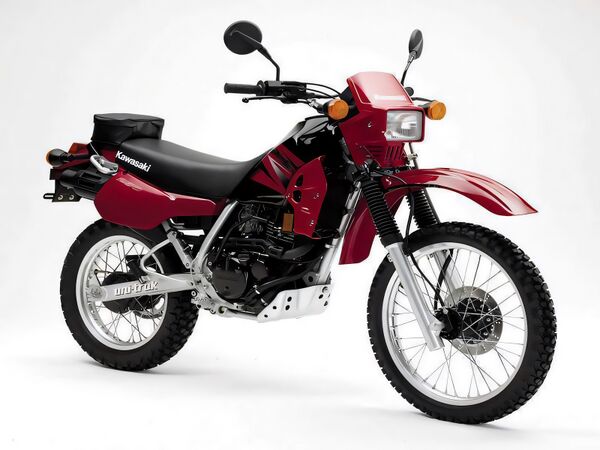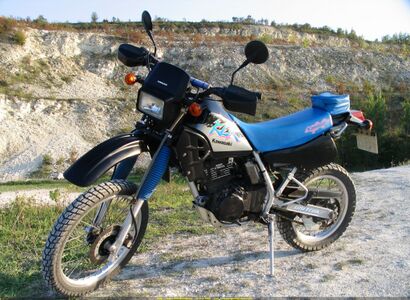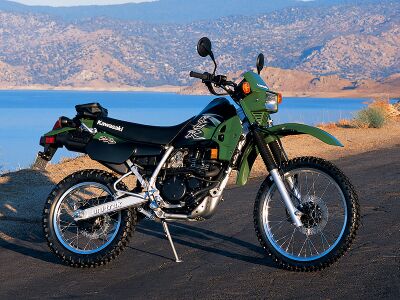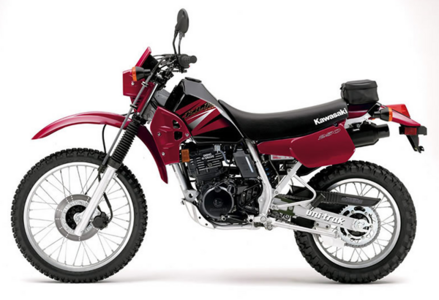Difference between revisions of "Kawasaki KLR250"
m |
m |
||
| (One intermediate revision by the same user not shown) | |||
| Line 1: | Line 1: | ||
{{DISPLAYTITLE: Kawasaki KLR250}} | {{DISPLAYTITLE: Kawasaki KLR250}} | ||
| + | {{#seo: | ||
| + | |keywords={{PAGENAME}}, review, specs, owners manual, service manual, guide | ||
| + | |og:image=https://en.enduro.team/images/f/f6/Klr250_mod3.jpg | ||
| + | }} | ||
__notoc__ | __notoc__ | ||
| − | [[file: Klr250 mod3.jpg | | + | [[file: Klr250 mod3.jpg | 600px | center | Kawasaki KLR250 (KL250-D) (November 1984) 1985-2005]] |
| − | + | '''Kawasaki KLR 250''' enduro first appeared in 1978 in the North American market. At that time, the model was an archaic (by modern standards) motorcycle, with an air-cooled engine, a round headlight, drum brakes and a rear suspension in the form of two shock absorbers. This generation had the factory code - '''KL250-A'''. | |
{{Ads_top}} | {{Ads_top}} | ||
| − | |||
| − | |||
| − | |||
| − | |||
| − | |||
| − | |||
| − | |||
| − | '' | + | ''' Lineup: ''' |
* '''Kawasaki KLR 250''' | * '''Kawasaki KLR 250''' | ||
* [[Kawasaki_KLR650 | Kawasaki KLR 650]] | * [[Kawasaki_KLR650 | Kawasaki KLR 650]] | ||
| − | '' | + | ''' Main competitors: ''' |
* [[Honda_XR250 | Honda XR 250 Baja]] | * [[Honda_XR250 | Honda XR 250 Baja]] | ||
* [[Yamaha_TT-R250 | Yamaha TT-R 250 Raid]] | * [[Yamaha_TT-R250 | Yamaha TT-R 250 Raid]] | ||
* [[Suzuki_Djebel_250 | Suzuki Djebel 250]] | * [[Suzuki_Djebel_250 | Suzuki Djebel 250]] | ||
* Honda XL 250 Degree | * Honda XL 250 Degree | ||
| + | |||
| + | In 1983, the model changes slightly, receiving the new factory designation '' KL250-C ''. This generation has a lot in common with the previous version. | ||
| + | |||
| + | In November 1984 (model year 1985), Kawasaki introduced the new generation KLR250 to the market under the new code “KL250-D”. This version is radically different from the previous ones - a new liquid-cooled engine, new suspensions, frame, headlight, plastic, front disc brake and more. It was this generation of Kawasaki KLR250 that gained the greatest popularity and was available not only in the USA and Canada, but also in many other countries - Japan, Europe, Australia, South Africa. This motorcycle was also actively used as a police version and for the needs of the army (special version). | ||
| + | |||
| + | Throughout the entire production period, from 1985 to 2005, the model practically did not change, but at the same time it enjoyed stable demand. Reliable and simple design, low price, increased fuel tank capacity (11 liters), soft long-travel suspensions and a 6-speed gearbox made the Kawasaki KLR 250 model extremely successful and suitable for use in any purpose - from off-road trips of the day to long motorcycle trips on the cross terrain. | ||
| + | |||
| + | In 2006, a new model was released to replace the KLR 250 - [[Kawasaki_KLX250 | Kawasaki KLX250S]]. | ||
== Photos == | == Photos == | ||
Latest revision as of 17:48, 5 July 2023
Kawasaki KLR 250 enduro first appeared in 1978 in the North American market. At that time, the model was an archaic (by modern standards) motorcycle, with an air-cooled engine, a round headlight, drum brakes and a rear suspension in the form of two shock absorbers. This generation had the factory code - KL250-A.
Lineup:
- Kawasaki KLR 250
- Kawasaki KLR 650
Main competitors:
- Honda XR 250 Baja
- Yamaha TT-R 250 Raid
- Suzuki Djebel 250
- Honda XL 250 Degree
In 1983, the model changes slightly, receiving the new factory designation KL250-C . This generation has a lot in common with the previous version.
In November 1984 (model year 1985), Kawasaki introduced the new generation KLR250 to the market under the new code “KL250-D”. This version is radically different from the previous ones - a new liquid-cooled engine, new suspensions, frame, headlight, plastic, front disc brake and more. It was this generation of Kawasaki KLR250 that gained the greatest popularity and was available not only in the USA and Canada, but also in many other countries - Japan, Europe, Australia, South Africa. This motorcycle was also actively used as a police version and for the needs of the army (special version).
Throughout the entire production period, from 1985 to 2005, the model practically did not change, but at the same time it enjoyed stable demand. Reliable and simple design, low price, increased fuel tank capacity (11 liters), soft long-travel suspensions and a 6-speed gearbox made the Kawasaki KLR 250 model extremely successful and suitable for use in any purpose - from off-road trips of the day to long motorcycle trips on the cross terrain.
In 2006, a new model was released to replace the KLR 250 - Kawasaki KLX250S.
Photos
Specifications
Specifications Kawasaki KLR250 (KL250-D, November 1984-2005):
| Model | Kawasaki KLR250 |
|---|---|
| Motorcycle type | enduro |
| Release year | 1985-2005 |
| Frame | steel half-duplex |
| Engine type | 1-cylinder, 4-stroke |
| Working volume | 249 cm³ |
| Bore / Stroke | 74.0 x 58.0 mm |
| Compression ratio | 11.0: 1 |
| Cooling | liquid |
| Number of valves per cylinder | DOHC, 4 valves |
| Fuel supply system | Carburetor, 1x Keihin CVK34 |
| Ignition type | CDI |
| Maximum power | 28.0 h.p. (20.6 kW) @ 9000 rpm - full-strength versions (Japan, North America, etc.) |
| Maximum torque | 22.0 Nm (2.3 kg * m) @ 7500 rpm - full-strength versions (Japan, North America, etc.) |
| Gearbox | 6-speed |
| Drive type | chain |
| Front tire size | 3.00-21 4PR |
| Rear tire size | 4.60-17 4PR |
| Front brakes | 1 disc, 250 mm, 2-piston caliper |
| Rear brakes | drum |
| Front suspension | 36 mm telescopic fork (with air pump), stroke - 230 mm |
| Rear suspension | linkage progressive Uni-Trak with monoshock (adjustable preload and rebound damping), stroke - 230 mm |
| Motorcycle length | 2200 mm |
| Motorcycle width | 855 mm |
| Motorcycle height | 1210 mm |
| Wheelbase | 1415 mm |
| Saddle height | 855 mm |
| Minimum ground clearance | 270 mm |
| Acceleration to 100 km / h | |
| Maximum speed | |
| Fuel tank capacity | 11.0 l |
| Motorcycle weight (curb) | 134 kg |
Kawasaki Off-Road Motorcycles
| Kawasaki | ||
|---|---|---|
| 85-150 см³ | KX85 · KX125 · D-Tracker 125 · D-Tracker 150 | |
| 200-250 см³ | D-Tracker 250 · KDX250 · Super Sherpa · KLR250 · KLX250 · KX250 · KX250F | |
| 300-350 см³ | KLX300 | |
| 400-500 см³ | KLX450 · KX450F · KX500 | |
| 600-750 см³ | KLR650 | |
Documentation



